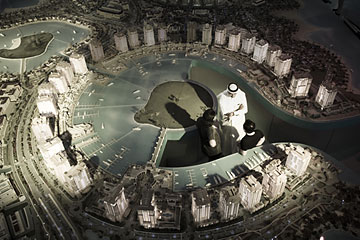
Arealestate sales office for Pearl-Qatar, a man-made-island project
(2 of 5)
A half-century ago, most Qataris lived in poor coastal fishing and pearl-harvesting villages or led precarious, nomadic lives amid the interior's desert wastes. Then oil and gas revenue began pouring in. Qataris now rank among the world's richest people, with GDP per capita of more than $98,000, twice as high as in the U.S. It has the world's third largest natural gas reserves, worth an estimated $10 trillion, and has generated growth rates that put China and India to shame. In 2011, GDP surged by 14.1%, following a 16.7% jump in 2010.
Yet the Qataris know the boom that has made them rich also leaves them vulnerable. Hydrocarbons account for nearly 60% of Qatar's economy, but oil and gas "are not going to be there forever," says Fahad bin Mohammed al-Attiya, counsel to the emirate's heir apparent. Nobody knows exactly when the gas will run out, but to prepare for that eventuality and diversify its economy, the government is funneling billions into education, entrepreneurship and the arts.
Satellite news channel al-Jazeera is Qatar's best-known export. The de facto voice of the Arab street, al-Jazeera has earned Qatar legions of fans, including U.S. Secretary of State Hillary Clinton, who once compared the station favorably with U.S. broadcasters, saying it offered "real news." With an estimated 150 million viewers internationally (though it is still not widely available in the U.S.), "al-Jazeera is Qatar's passport to the world," says Qatari media consultant Hassan Rasheed.
If al-Jazeera is Qatar's introduction to the world's newshounds, the nation's investments in culture, sports, education and blue-chip companies will bring it to the attention of everyone else. The 2,500-acre (1,000 hectare) Education City on the outskirts of the capital, Doha, houses the Middle East branches of eight top-ranked international universities, including Georgetown, Carnegie Mellon and Northwestern. Qatar also hosts branches of international think tanks such as the Brookings Institution and the Royal United Services Institute (RUSI). In theory these institutions, like al-Jazeera, are completely independent. Still, most employees hesitate to speak frankly on the record about their hosts for fear of inviting scrutiny. And with good cause: a Qatari poet was sentenced to life in prison last month for penning a verse about the Arab Spring that, officials say, insulted the Emir. Qatar has also been widely criticized by human-rights groups for abuses against migrant workers.
The Royal Women
Qatar is unusual among the oil-rich states of the Gulf for the prominent public role played by its royal women. The Emir's glamorous second wife Sheika Mozah bint Nasser is often at the Emir's side during high-level political appearances, her hair tucked under a chic mini-turban rather than under an enveloping veil. She is the head of the Qatar Foundation, which has dispensed billions in charity and development projects dedicated to education. The Emir's daughter Sheika al-Mayassa bint bin Khalifa al-Thani is one of the most powerful patrons in the art world. She oversees a clutch of museums that are home to the Gulf's best collection of Islamic art, including an I.M. Pei--designed building that floats, mirage-like, in Doha's harbor.
